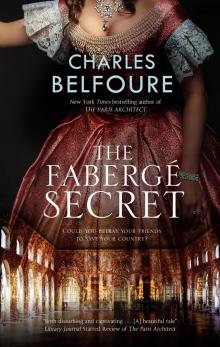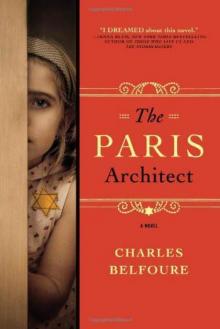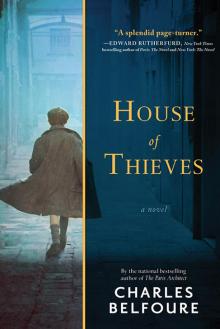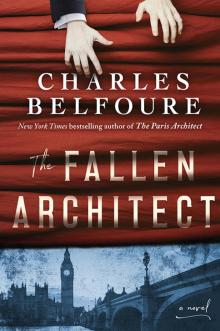- Home
- Charles Belfoure
House of Thieves Page 3
House of Thieves Read online
Page 3
At Madison Square, where Fifth Avenue and Broadway collided then separated, the building style shifted and became a mix of commercial and residential. The Fifth Avenue Hotel, currently the city’s most fashionable, stood on the left. The spire of the Marble Collegiate Church towered above Twenty-Ninth Street. Then, on the left, came a familiar sight: William Backhouse Astor II’s wide brownstone. Aunt Caroline’s home. To the south was a large walled garden that connected to her brother-in-law John Jacob Astor III’s house.
The previous summer, Cross had stood in the garden with the Astors, looking over the high wall at President Grant’s funeral procession. Now, as he passed Aunt Caroline’s house, he smiled at its modesty. It was really only an extra-large brownstone, but that was the way it was supposed to be: unpretentious, dull, and respectable.
As the horse-drawn omnibus slowly rattled along on the cobblestones, halting to pick up and drop off passengers, Cross glimpsed the cathedral. Just north of Fiftieth Street, Saint Patrick’s was complete but for its two spires, finally under construction after a hiatus of almost eight years. Its architect was James Renwick Jr., a man Cross greatly admired. Both were in the New York chapter of the American Institute of Architects. When he got the commission, Renwick had traveled around Europe for more than three years, observing and sketching twin-spired churches. Finishing Saint Patrick’s soaring towers would complete a magnificent design that rivaled the cathedrals of the Old World.
The Knickerbockers, Protestant to the core, were shocked that such a huge Catholic church could be built on Fifth Avenue. It dwarfed nearby elite Protestant churches like Saint Thomas and Fifth Avenue Presbyterian. Weren’t there laws against such a thing, the Knickerbockers protested. The fact that the church was paid for with the nickels and dimes of Irish immigrants, the same trash that washed the Knickerbockers’ floors and dishes, was even more galling. There was talk of building a Protestant cathedral on the West Side to put the Catholics in their place.
Sighing, Cross shifted his gaze. The daily promenade by the fashionable had begun. Men in elegantly tailored frock coats accompanied by women in beautiful walking dresses with tasseled parasols filled Fifth Avenue’s sidewalks. “Shoddyites,” the Knickerbockers called these “fashionable” new people. They dress magnificently, Cross thought, making up in display what they lack in taste and education. He recognized a client but made no effort to wave to him.
In front of the cathedral, Cross got off the omnibus and walked inside. He’d been to the church many times, and on each visit, he marveled at the nave’s breathtaking vaulted ceiling, supported by rows and rows of Gothic arches. It ended at an altar in a full-height semicircular apse, lit by tall windows of stained glass. He felt as if he were in France. It was amazing how the thick stone walls of the church kept the interior so cool and refreshing, even on such a miserably hot day.
Most men hated what they did for a living—it was just a means to pay the bills—but Cross genuinely loved being an architect. He was proud that he’d chosen the right path in life and dreamed of being the best architect in the city (although he knew there was a lot of competition). He wanted someday to design something as magnificent as this cathedral, something that people would use for centuries after he was gone from this earth. Cross felt he had the talent to do it. He ran his hand over the cool stone of a column and smiled. Yes, he thought, one day I’ll do something truly great. He turned and looked around for his new client.
His odd visitor had told him that a Mr. Kent would be waiting for him in the rear pew on the northwest corner. It seems so mysterious, Cross thought again, shaking his head. He walked toward the corner and saw a distinguished-looking man. He appeared to be about forty, clean-shaven, with swept-back hair and a sharp, almost hawk-like nose. Most encouraging, he looked like a very prosperous client.
“Mr. Kent?”
“It must be a wonderful thing to be an architect, Mr. Cross,” Kent said, eyes fixed on the nave ceiling. “To think, you design and draw every square inch of a church like this. You decide what it will look like, down to the tiniest detail. Like that decoration atop that cluster of columns holding up the arch.”
Cross took an instant liking to this fellow.
“Yes, it is wonderful,” he said.
Kent stood and extended a hand, which Cross shook. “James T. Kent. Thank you for coming on such short notice.”
“I’m glad to meet you, sir. I’m told you have a building you want designed?”
“Mr. Cross, although I do very much admire your work, I’m afraid you were brought here on a pretense.”
A frown replaced the smile on Cross’s face.
Kent continued. “I’ll get to the point. This meeting involves a personal matter. I’m afraid that your son George has been doing business with me for the last year or so. Now he finds himself in serious financial difficulty. You see, he owes me a great deal of money.”
“He—how much money?”
“Please sit down, Mr. Cross.”
“How much?”
“About forty-eight thousand dollars.”
Cross stood for a moment, dumbfounded, and then slumped into the pew as though someone had clubbed him. He rubbed his hand over his mouth, unable to speak. “I don’t believe you,” he finally forced out.
“I’m afraid you must, Mr. Cross. George will tell you himself that it’s forty-eight thousand dollars—and that he has no way of paying it back.”
“How could he owe you that much, for God’s sake?”
“Of course, I suppose you don’t know. George has a serious gambling habit, sir, and in very ungentlemanly places. The Bowery, the Tenderloin—you will see my meaning.”
“No, no. That can’t be,” Cross said through tightly clenched teeth.
“Parents are always the last to know their children’s shortcomings.”
Cross stood, furious. “Who are you, scoundrel?”
“A businessman, sir. Who expects to be paid back.”
“You’re a criminal who took advantage of my son. There’s no way he can pay you.”
“Then George is going to die, Mr. Cross.”
Cross sat back down, gazing in stunned silence at the padded leather kneeler of the pew. “You can’t threaten me,” he said at last, defiantly.
“It’s not a threat, Mr. Cross. It’s an ironclad guarantee. George will die if he does not pay me back.”
“He’s only twenty-two! He just graduated from Harvard. He—”
“And you must be very proud of him—at least until now,” Kent said with a smile.
“I won’t let you kill him, do you hear me?” Cross said, his voice rising above the accepted volume for the hushed solitude of a church. A woman praying over her rosary in a nearby pew gave him a disapproving look. Now he understood why Kent had wanted to meet him in a public place, and he clenched his fists.
“I know you won’t,” Kent said. “You’re going to pay George’s debt for him. You’ll even pay the interest, which is accruing as we speak.”
Cross laughed derisively. “Do you really suppose I’ve got forty-eight thousand dollars?”
“No, but you know where to get it—and more.”
“What the hell are you talking about?”
“You’re a successful architect, Mr. Cross. You’ve designed mansions for the rich, office buildings for all kinds of big companies and banks. Places that hold things of great value.”
“You damn fool, you expect me to go and rob them?”
“Not at all. I expect you to help me rob them.”
“You’re mad.”
“Am I? If you don’t, pieces of George’s body will be found floating around the island of Manhattan tomorrow. I give you my word on that. But for the present, George is my guest.”
“That’s a lie! He went home last night.”
“Then how do I come to have this?” Kent smiled a
nd handed a slip of paper to Cross, who let out a groan when he saw what it was—George’s membership card to the Union League Club. “Impressive that someone so young is a member of the most prestigious club in the city, Mr. Cross. Myself, I belong to the New York Club.”
Cross stood, grabbing Kent by the lapel of his frock coat. “You’re bluffing. I’ll go to the police about this, and you’ll be thrown in prison, you damn rogue.”
Unruffled, Kent gently removed Cross’s hand. “I urge you not to do that, Mr. Cross. It will mean death for your son. In fact, I’ll kill him in front of you and then kill you. Please believe me. I trust you’ll understand that it’s best you cooperate and pay back the debt. Then the whole matter will be settled. But until you agree, George will remain with me.”
“You can go to hell!” Cross shouted and stomped out of Saint Patrick’s, the echo of his footsteps bouncing off the white marble walls.
On Fifth Avenue, he stood in a daze in the middle of the sidewalk. A flood of pedestrians from either direction swept around him, like a stream around a boulder. His mind spun. He felt as if he were being sucked into a vortex, a horrible nightmare. If only he could wake up in his bed, begin the day anew, realize with a sob of relief that none of this had happened.
It can’t be. This had to be some practical joke by George and his friends. That’s it! Cross thought with a mixture of anger and happiness. It was a joke, and he had been taken in. His son was alive and safe. Perhaps Stanny was behind the charade. If so, he’d curse his old friend up and down for putting George up to such a thing.
A feeling of relief swept over Cross. His breathing returned almost to normal, and he started walking south. But when he came to Forty-Ninth Street, he stopped abruptly.
Suppose this wasn’t a joke.
A man in a derby and dark gray frock coat collided with his back. “Damned idiot,” the man muttered, stepping around him. Cross took no notice. With a sinking feeling, he replayed the events of the morning in his head. It was too cruel and elaborately staged to be a joke. But if it was all true—Kent wasn’t bluffing—he couldn’t stand by and let his son be murdered. He’d give his life in a second to save George or Julia or Charlie. The thought of losing his children was too horrible to bear.
Cross walked blindly, covering block after block as if in a trance. He crossed streets without looking, lucky not to be run over by the parade of wagons and carriages. All the while, his mind raced with terrible images of how Kent would murder George. How had his son gotten into such a fix?
In that instant, Cross realized he knew as much about George as one of these strangers next to him on the sidewalk. His son wasn’t what he seemed. His handsome, charming facade masked deviant, illicit behavior. Cross had thought he’d been a model father. Well, the joke was on him. If what Kent had told him was true, then he’d failed miserably. His knees almost buckled under him, nearly sent him to the ground right there on Fifth Avenue. A son’s faults are his father’s faults, his mind repeated numbly.
He realized he couldn’t face this alone, but he couldn’t tell Helen. At heart, she was a weak-willed, status-obsessed woman who’d collapse into hysterics if he told her what their son had done. Cross kept walking, passed Aunt Caroline’s house at Thirty-Fourth Street—and stopped dead in his tracks. Of course—he had the Astors, the most powerful force in the city, on his side. Surely they could save George.
Cross started sprinting up the front stoop but halted midway. What was he thinking? The thought of knocking on Caroline’s door and telling her what had happened filled him with shame. George’s dishonor would repulse her, and knowing Caroline, she’d slam the door on his family. If her son, Jack, had found himself in this kind of fix, it was merely a matter of writing a check and keeping the whole thing secret. But being poor, distantly related Schermerhorns and Livingstons only went so far. Society people walked on eggshells their whole lives to avoid the merest whiff of scandal. Cross had seen lives shattered by a mere whisper, no matter how untrue. And if it was true…
No, he couldn’t go directly to Caroline. But perhaps he could reach out to someone in her circle of influence, a person he wasn’t tied to by blood. Cross walked to the bottom of the stoop and thought for a while. Then he walked slowly downtown to Madison Square, oblivious to the scorching sun that beat down upon him. Continuing on Broadway, he stopped in front of the recently finished Lincoln Building at Fourteenth Street. The office of Thomas Griffith, the Astors’ most trusted attorney, was located there. Griffith, the city’s paragon of the legal profession, would tell Cross what to do, and he’d never breathe a word to the Astors.
Finally feeling a small measure of relief, Cross entered the towering, ten-story limestone building.
5
Even if it hadn’t been a sweltering July night, Cross wouldn’t have been able to sleep. He was still too shaken and frightened by the day’s revelations.
After tossing and turning for hours, he finally gave up and rose. Thankfully, he and Helen had separate bedrooms. If they’d slept in the same bed, his wife would have known immediately that something was wrong. Cross usually slept like a rock.
Putting on his dark green silk dressing gown, Cross sat on the settee in the parlor and smoked until dawn’s light streamed in through the gap in the heavy velvet drapes hanging over the tall windows. He couldn’t get his mind off what George had done. It didn’t seem possible that Kent was talking about his son. Did George really live in a secret world, one unfathomable to Cross?
Of course Cross knew what gentlemen of his class did when away from the prying eyes of their families. Stanford White was the supreme example of a gentleman’s penchant for extracurricular activities, and Cross was no saint himself. But even those debaucheries followed class boundaries. You’d never see White on the Bowery or in a Chinatown gambling den.
President Eliot’s words from George’s graduation party rang in Cross’s ears: “…vices born of luxury and self-indulgence on the rise.” At the time, Cross had thought with self-righteous satisfaction that Eliot’s words didn’t apply to his boy. He’d seen high-society fathers destroy their sons with money, yachts, racehorses, and anything else they wanted—gifts that killed the boys’ ambition. Despite his own past, Cross had avoided this path. Yes, he came from a society family with all the Knickerbocker advantages: elite private schools, summers in Newport and the Berkshires, riding, shooting, European tours, servants, balls. He’d gone to Harvard too. But then, defying the Knickerbocker business tradition, he went to Paris to train in architecture at the École des Beaux-Arts. After apprenticing for one of America’s greatest architects, Henry Hobson Richardson, he’d set up his own practice. Cross had had a real goal in life. In turn, he wanted to set an example for his son. To his delight, George had great dreams too—to become a mathematician and teach, perhaps as a professor at Harvard. What the hell had happened?
None of that matters, Cross told himself. What mattered was keeping George alive. Speaking to Thomas Griffith yesterday had set Cross’s mind somewhat at ease, if only because it allowed Cross to share his desperate burden.
To Cross’s surprise, Griffith, a taciturn, granite-faced man of seventy, had turned ashen when he’d heard Kent’s name. Kent, he explained to Cross, was a well-bred, Princeton-educated man from a wealthy mercantile family in Baltimore. Rumor had it that he’d originally trained to be a doctor. His connections at the highest levels of business and government in New York made him a man of great influence and power. Even Tammany Hall, the political machine that ran the city, did what he told them to do.
Kent was a man to be feared. Although he was already so rich he didn’t need the money, he ran an extensive crime organization that committed any kind of depravity that would turn a profit. His gang was nicknamed “Kent’s Gents” because they dressed like society gentlemen, down to their gold-capped walking sticks, which were used more frequently for beating people to death than strolling about.
/>
The attorney made Cross repeat the conversation they’d had at Saint Patrick’s word for word. Then, with a terrified look on his face, Griffith told Cross that they had to move quickly or George would indeed be killed. Kent did not make idle threats.
At these words, Cross groaned as if he’d been punched in the stomach and dropped his head, tears welling up in his eyes. Griffith went to the telephone on his office wall and asked for police headquarters on Mulberry Street. He was immediately connected to Thomas Byrnes, chief inspector of the New York City Police Department. From his tone, they seemed to be good friends. Griffith explained that he was calling on a matter of great urgency, and Byrnes agreed to see him first thing the next morning.
Cross had breathed a great sigh of relief when he heard the policeman’s name. Byrnes was a ruthlessly efficient Irish cop who had transformed the New York City police, weeding out corruption and modernizing investigations with innovations like mug shots, which created a photographic gallery of known criminals. Before Byrnes’s arrival, the New York underworld had seen the city’s police force as a joke. But all that had changed. Wall Street, for instance, had always been a rich hunting ground for criminals, who preyed on bank messengers, robbing them of the bonds, securities, and cash they carried from bank to bank. Byrnes declared that Fulton Street, the northern boundary of Wall Street, would be a “dead line,” below which all criminals would be arrested on sight. He was true to his word, and robberies on Wall Street soon dropped to zero.
Byrnes, Cross realized, was the only man who could save his son.

 The Fabergé Secret
The Fabergé Secret The Paris Architect: A Novel
The Paris Architect: A Novel House of Thieves
House of Thieves The Fallen Architect
The Fallen Architect